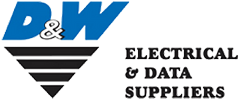
Safety Alert 112 - Heat Wave Warning
What is a heat wave?
A heat wave is a period of unusually hot weather in an area, that lasts three days or more. In WA this is usually three or more days above 35*C. Heat waves can be a serious hazard, causing more deaths in Australia in the past 200 years than any other natural hazard. Extreme heat events are becoming an increasingly common occurrence throughout WA. The state government has a new warning system to alert you to the health dangers of heat waves - more information is available here.
How to prepare for a heat wave
There are many things you can do to prepare for a heat wave at home and at work.
At home:
• Check air-conditioners and fans are working and set to the ‘cool’ setting.
• Keep your home cool by keeping windows closed and shutting all blinds and curtains.
• Have a battery, solar or wind-up powered torch and radio available. Have spare batteries on hand.
• Keep electronic devices such as mobile phones and laptops charged.
• Keep in regular contact with family, friends, and neighbours.
• If you have acute or chronic medical conditions, talk to your doctor about the best ways to cool down during very hot weather.
• If your doctor normally limits your fluids or you are on fluid tablets, you may need to check how much to drink in hot weather.
• Ensure you have a safe place and plenty of water out for your pets.
At work:
• Know where you can go to cool down.
• Ensure you have supply of suitable drinking water.
• Complete hot works in advance if possible.
• Keep electronic devices such as mobile phones and laptops charged.
• Keep in contact and check in with co-workers regularly.
What to do in a heat wave
If you are working outside during a heat wave period, these are some of the recommendations to help you stay healthy and avoid heat related illnesses:
- Keep hydrated by drinking plenty of fluids. Fluids include water, diluted juice (mixed with water) and low sugar sports drinks. Limit or avoid alcohol and caffeinated drinks (including tea, coffee, and energy drinks) as these can increase dehydration.
- Stay out of the heat as much as possible, adjust work activity times to avoid the heat, such as doing outside work during the cooler part of the day. If you do go outside make sure to put on a hat and sunglasses, apply sunscreen and try to stay in the shade.
- Take regular breaks.
- Keep your immediate space cool with circulating air where possible.
- Keep an eye on your colleagues, sometimes it’s easier to see the effects of heat on someone else than to feel the effects yourself.
- Be aware of the UV index and heat wave warnings for your area and respond appropriately.
- Know and monitor the signs of heat-related illness and act promptly (refer to Safety Alert 104).
Health impacts of heat waves
During extremely hot weather you are more at risk of experiencing heat-related illnesses such as dehydration, heat stress and heat stroke.
Watch out for the signs and symptoms in yourself and your colleagues:
- Being thirsty or extreme thirst.
- Dry mouth, including lips and tongue.
- Light-headedness and/or dizziness, particularly when standing up or abnormal walking.
- Headache.
- Dark urine or not as much urine as normal.
- Fast heart rate.
- Fast breathing.
- Fever
- Feeling irritable, drowsy, confused, or tired and lethargicFeeling faint.
- Muscle cramps.
- Confusion.
- Incoherent speech.
- Coma or seizures.
If you notice any of these symptoms, it time to stop and take appropriate action. The steps to be taken will be different depending on the severity of the symptoms, but some steps to take are;
- Rest in a cool, well-ventilated area.
- Remove excess clothing.
- Drink small amounts of cool water, often.
If symptoms are severe call 000 - heat stroke can kill.
Further Resources
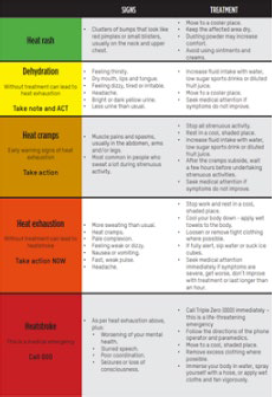
Health Illness Table
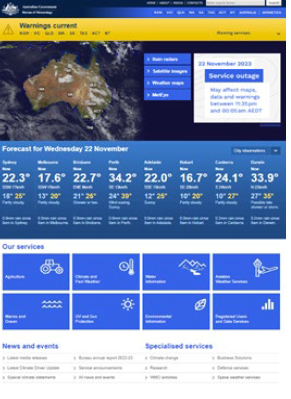
Beauru of Meterology
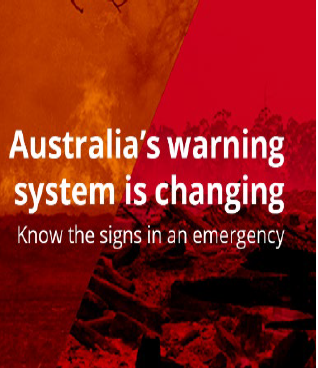
Learn about the Australian Weather Warning System
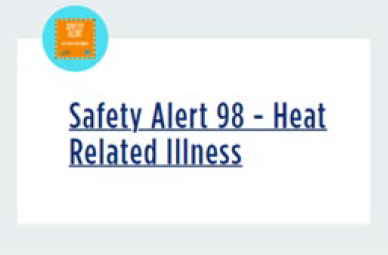
EGT Safety Alert 98
Read EGT's Heat Related Illness Safety Alert
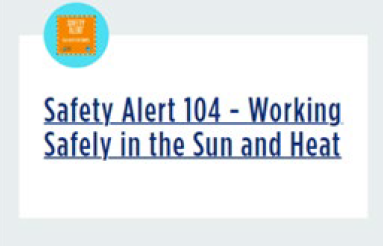
EGT Safety Alert 104
Read EGT's Working Safely in the Sun and Heat Safety Alert


